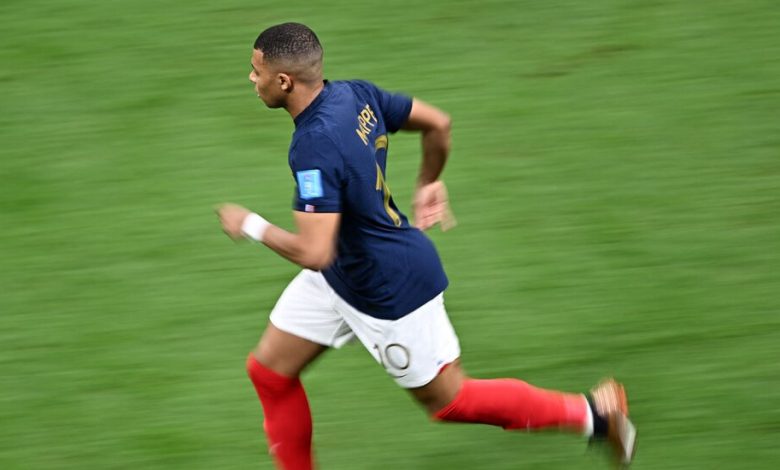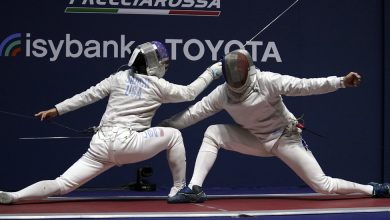Two Favorites, Two Underdogs, Too Good

DOHA, Qatar — Even Didier Deschamps, France’s ordinarily gnomic coach, seemed a little insouciant in the small hours of Sunday morning. His team had edged past England in a tense, taut sort of a game, the kind that made the insistence of the stadium’s hype man, immediately after the final whistle, that it had been “a lot of fun” for everyone seem more than a touch discordant.
Deschamps’s chipper mood was easily explained. With his team’s 2-1 victory, he had achieved the only target even the best team in the world, the reigning champion, had dared to set before this World Cup. France had outlasted not only England but Brazil, Spain and Germany, too. It had made the final four. Whatever happens from this point on counts as extra credit.
Both of the semifinals follow largely the same template, pitting one of the teams who arrived in Qatar as an established contender against one of the tournament’s largely unheralded outsiders. The mention of that framing was the only thing that dispelled Deschamps’s good cheer. “Any of the four teams can win it,” he said.
Given everything that has happened over the last three weeks to bring the World Cup to this point, it is hard to disagree.
Argentina vs. Croatia
Tuesday, 2 p.m. ET, Lusail Stadium
The emotion pulsing through Argentina’s players and fans alike has never been far from the surface in Qatar. Its form, its shape, has changed over the course of five games, ranging from the caterwauling after an opening defeat to Saudi Arabia to the belligerence of a narrow victory over the Netherlands, taking in relief, hope, euphoria and pride along the way.
A Brief Guide to the 2022 World Cup
What is the World Cup? The quadrennial event pits the best national soccer teams against each other for the title of world champion. Here’s a primer to the 2022 men’s tournament:
Where is it being held? This year’s host is Qatar, which in 2010 beat the United States and Japan to win the right to hold the tournament. Whether that was an honest competition remains in dispute.
When is it? The tournament opened on Nov. 20, when Qatar played Ecuador. Over the two weeks that follow, four games will be played on most days. The tournament ends with the final on Dec. 18.
Is a winter World Cup normal? No. The World Cup usually takes place in July. But in 2015, FIFA concluded that the summer temperatures in Qatar might have unpleasant consequences and agreed to move the tournament to the relatively bearable months of November and December.
How many teams are competing? Thirty-two. Qatar qualified automatically as the host, and after years of matches, the other 31 teams earned the right to come and play. Meet the teams here.
How does the tournament work? The 32 teams are divided into eight groups of four. In the opening stage, each team plays all the other teams in its group once. The top two finishers in each group advance to the round of 16. After that, the World Cup is a straight knockout tournament.
How can I watch the World Cup in the U.S.? The tournament will be broadcast on Fox and FS1 in English, and on Telemundo in Spanish. You can livestream it on Peacock, or on streaming services that carry Fox and FS1. Here’s how to watch every match.
When will the games take place? Qatar is three hours ahead of London, eight hours ahead of New York and 11 hours ahead of Los Angeles. That means there will be predawn kickoffs on the East Coast of the United States for some games, and midafternoon starts for 10 p.m. games in Qatar.
Got more questions? We’ve got more answers here.
That wild oscillation, on some level, feels unsustainable; energy is a limited resource, after all, and Argentina — driven by the belief that winning this World Cup is Lionel Messi’s undeniable destiny — is burning through its supplies at a far greater clip than any other team.
Alternative readings are available. Argentina has shown a nerve and a coolness even in that white heat that indicates a certain steel. Against the Dutch at Lusail on Friday evening, for example, Lionel Scaloni’s team was far superior for vast stretches of the game. But even more impressive than its performance was that it recovered from conceding a late equalizer to win the game on penalties.
The complication, now, is that Argentina faces a Croatia team that has its own undeniable sense of purpose, a team that does not seem able to countenance the prospect of defeat, one that has shown a remarkable ability over the last two tournaments to outlast almost anyone that stands in its way, one that refuses to accept that it could be simply a character in someone else’s story.
France vs. Morocco
Wednesday, 2 p.m. ET, Al Bayt Stadium
On the surface, for all Deschamps’s insistence that his team will not fall victim to complacency, it would appear overwhelmingly likely that, four years after it lifted the trophy, France will return to the final. This time it is seeking to become the first side since Brazil in 1962 to mount a successful defense of its World Cup title.
France, after all, has not only the tournament’s leading scorer — Kylian Mbappé — and the most gifted player on the planet — also Kylian Mbappé — but an enviable array of attacking threats, a well-balanced midfield and a redoubtable defense. It barely broke a sweat in this tournament before facing England, and such is France’s self-assurance that it needed to play well for less than a third of that quarterfinal to make it through.
There are two things, though, that will give Deschamps pause for thought. The first is Morocco’s bloody-minded obstinacy. Walid Regragui’s team has faced Portugal, Spain, Belgium and Croatia in this tournament, and it has not conceded a single goal to any of them. Indeed, the only time its defenses have been breached — against Canada — the wound was self-inflicted. If anyone can shut Mbappé down, it is probably his Paris St.-Germain teammate, Achraf Hakimi.
Just as significant, though, is the fact that this will feel like a Moroccan home game. Regragui’s team has not just been followed to Qatar by tens of thousands of its own fans, it has picked up countless supporters on its way to becoming the first African team to make the semifinals of the World Cup.
It stands, now, as an avatar not only for its continent but for its region, too, an impassioned, inspired standard-bearer for the Arab world. That has manifested in each and every one of its games so far; the French may have faced more illustrious teams here, but they have certainly not encountered such a hostile atmosphere.




